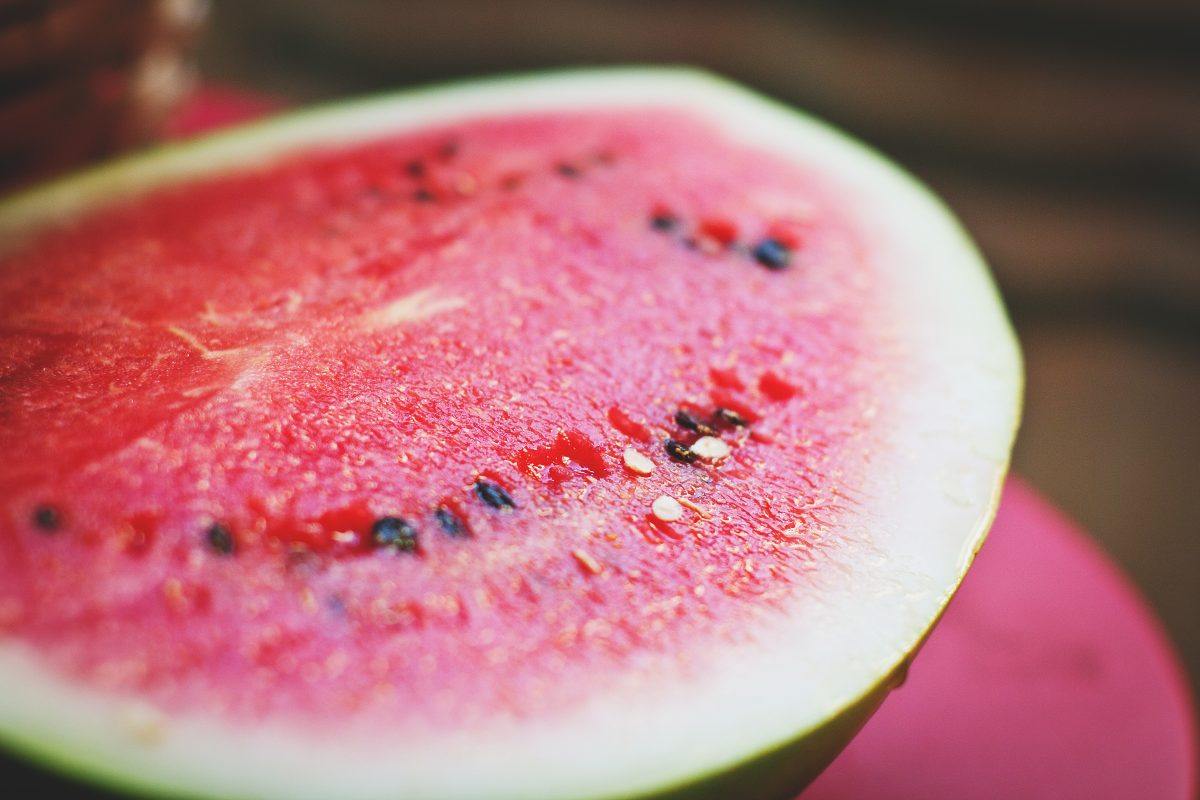As summer brings warm days and later evenings, many of us head outdoors for good fun and food. Whether you’re hosting a backyard cookout, or planning a picnic on the go, be sure to fuel your family with summertime meals that are both nutritious and safe.
Best Picnic Eats
If you plan to bring food that will remain outdoors for several hours, choose foods that won’t wilt, melt, or spoil easily in the heat. Good choices are fresh firm vegetables (raw or cooked), chopped fruit, whole grains, pasta salad, beans, and trail mix! Here are some additional ideas to inspire your picnic basket or cookout spread:
- Make vegetable kabobs with raw or lightly grilled cubed zucchini and summer squash, bell peppers, cherry tomatoes, and mushrooms. Pair with heat-friendly dips such as salsa, pesto, hummus, or baba ganoush (pureed eggplant).
- Crunchy Roasted Chickpeas make a flavorful high-fiber protein-packed snack.
- Slice peaches, mango, melon, strawberries, and pineapple, or any other combination of fruit to create a brightly-colored fruit salad. Or, finely dice the fruit and sprinkle with cinnamon, lime juice, and lime zest to create a fruit salsa. Serve on top of mini brown rice cakes.
- Consider going meatless with plant proteins that hold up well in the heat like beans, nuts, seeds, tofu, or tempeh. These can be mixed into salads, grain dishes, and casseroles.
- While soft high-moisture cheeses can spoil, firm lower moisture cheeses like cheddar or parmigiana reggiano are good alternatives. For a savory-sweet dessert, serve thin cheese wedges with walnuts or shelled pistachios and dried fruit like figs, apricots, cherries, mango, or pineapple.
Check out these other picnic-friendly (and portable!) ideas:
VEGETABLES AND FRUITS
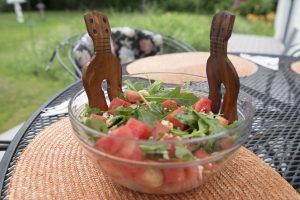 Eggless Caesar Salad
Eggless Caesar Salad- Green Beans with Dried Cherries
- Southwestern Corn Hash
- Spicy Indian Slaw
- Citrus Salad with Ginger Lime Dressing
- Arugula, Watermelon, Feta, and Mint Salad with Balsamic Vinaigrette
WHOLE GRAINS AND BEANS
- Farro Roasted Confetti Vegetables
- Fantastic Bulgur Dish
- Whole Wheat Penne with Pistachio Pesto and Cherry Tomatoes
- Whole Wheat Pasta with Fresh Basil Pesto, Corn, and Zucchini
- Vegetarian Refried Beans can be spread in a whole grain tortilla and topped with the Farro Roasted Confetti Vegetables or Spicy Indian Slaw listed above
DON’T FORGET TO HYDRATE!
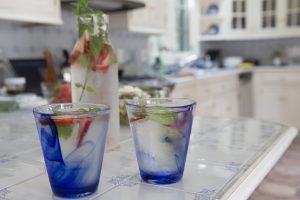 Skip the usual beverage haul that involves lugging a heavy cooler filled with ice and individual drink bottles or cans. To reduce waste and lighten the load, have everyone carry their own reusable insulated water bottles. If refills are needed, bring a jug filled with ice water or one of these refreshing naturally sugar-free healthy beverage recipes.
Skip the usual beverage haul that involves lugging a heavy cooler filled with ice and individual drink bottles or cans. To reduce waste and lighten the load, have everyone carry their own reusable insulated water bottles. If refills are needed, bring a jug filled with ice water or one of these refreshing naturally sugar-free healthy beverage recipes.
A Healthier Grill
Hot dogs, hamburgers, and sausages are popular choices for grill food but rank low in healthfulness. They are linked with an increased risk of colorectal and stomach cancers, diabetes, and heart disease. Along with high amounts of sodium, processed meat contains added nitrates and heme iron (a type of iron found only in animal foods) and are usually cooked with very high heat, all of which can produce cancer-causing compounds called heterocyclic amines (HCAs). During grilling, the fat from rich cuts of meat tends to drip into the flames, producing more smoke and carcinogens called polycyclic aromatic hydrocarbons. To reduce your exposure to these elements:
- Avoid breathing in smoke produced from the grill.
- Try grilling fish, or lean poultry trimmed of any visible fat, veggie burgers, and a range of veggies. These recipes are great for grilling:
- Reduce your grill time: fish, vegetables, and veggie burgers cook quickly. Poultry or meat can be cut into small chunks for kebobs.
- Try using a marinade, which may reduce the production of carcinogens. Some research suggests specific ingredients for marinades such as the acid from lemon or vinegars, or herbs with antioxidant properties like rosemary, garlic, and thyme.
- If serving meat, some other suggestions include:
- Avoid charring meat, or remove any charred parts before eating.
- Wrapping the meat in foil, which can speed cooking time and protect it from smoke.
Video: Dr. Guy Crosby grills some miso marinated salmon, and shares his tips for a healthy cookout.
Food Safety
Cases of foodborne illness tend to spike in the summer. There are several reasons. One is that harmful bacteria thrive in warm humid temperatures. The danger zone is between 40-140°F when bacteria can double in number in about 20 minutes, and even faster between 90-100°F. Another potential safety hazard is preparing and serving meals outdoors with unwashed hands or on contaminated surfaces. Bring sanitizer to use before and after eating, after using a restroom, after handling pets, and after changing diapers.
Although common fare at picnics, reconsider bringing the highly perishable foods listed below. If you can prevent food from spoiling in warm weather, there is less food to throw out and less waste. If you must bring perishable items, surround them with ice packs and store in a shady spot. According to the USDA Food Safety and Inspection Service, discard perishable foods that have been left at room temperature for more than two hours (one hour if the temperature is higher than 90°F).
- Dishes or dips made with dairy (butter, cream, cream cheese, or other soft cheeses)
- Mayonnaise-containing dishes like salads (potato, chicken, tuna, egg) and deviled eggs
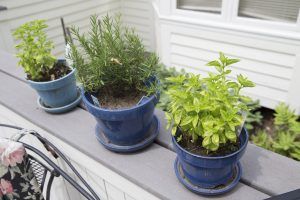
Don’t be shy in seasoning your food with herbs and spices. Not only do they infuse diverse flavors into your dish and offer beneficial plant chemicals called polyphenols (these are also abundant in some fruits, vegetables, and teas), but research has demonstrated the antimicrobial properties of certain herbs and spices. Garlic, onion, oregano, thyme, cinnamon, tarragon, rosemary, and cloves have been shown to prevent the growth of and even kill some bacteria including strains of E. coli, salmonella, and streptococcus. However, the exact amount of herbs and spices needed in food to produce an antibacterial effect as well as its form (as extracts, essential oils, dried vs. fresh, etc.) is conflicting, so do not rely on herbs and spices alone for food safety!
Minimize Waste
An overflowing trash bin is a common site at cookouts and picnics. Instead of bringing disposable paperware and utensils, soda cans, and single-use water bottles, use products made of glass, bamboo, cloth, wood, ceramic, or stainless steel that can be washed and reused. Consider these tips to reduce waste:
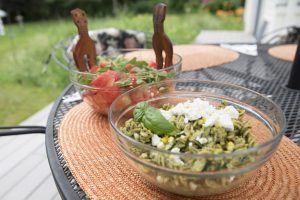 Prepare finger foods so that extra utensils are not needed, or invest in compostable or reusable flatware.
Prepare finger foods so that extra utensils are not needed, or invest in compostable or reusable flatware.- Use cloth napkins and tablecloths instead of paper or plastic.
- To minimize food waste, prepare a little less food than you think you’ll need, as the tendency is often to bring too much. Store in reusable containers such as lightweight stainless steel so that leftovers can be brought home (however, discard perishable foods that were not stored in a cooler or were left at room temperature for more than two hours).
- Use metal skewers instead of wood or plastic skewers for kabobs.
- Bring an extra bag to store any recyclable items (e.g., single-use water bottles, aluminum cans, plastic containers, paper packaging) to toss into your recycle bin at home.
Terms of Use
The contents of this website are for educational purposes and are not intended to offer personal medical advice. You should seek the advice of your physician or other qualified health provider with any questions you may have regarding a medical condition. Never disregard professional medical advice or delay in seeking it because of something you have read on this website. The Nutrition Source does not recommend or endorse any products.
